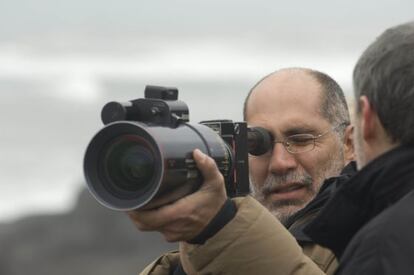Nine acts of religious faith
Peter Gabriel, Vargas Llosa and leading filmmakers unite for ‘Words with Gods’

Religion may not be a recommended subject for dinner conversation, but it is for cinema. To demonstrate the fact, Amores perros and Babel screenwriter Guillermo Arriaga has teamed up with eight well-known filmmakers to create Words with Gods, the first of four films about taboo topics. The Oscar nominee has also announced that musician Peter Gabriel and Nobel Prize-winning author Mario Vargas Llosa will also be working on the project. The former will be in charge of creating the music for the opening and the close of the film, while the Peruvian novelist has designed the film’s narrative structure.
Words with Gods comprises nine short films written and directed by the filmmakers Héctor Babenco, Bahman Ghobadi, Amos Gitai, Alex de la Iglesia, Emir Kusturica, Mira Nair, Hideo Nakata, Warwick Thornton and Arriaga himself. Each story tells a fictional tale revolving around a different religion, from Judaism and Orthodox Christianity, to Catholicism and Islam, with Arriaga coordinating the whole venture.
“We did it trying to be as respectful to the religions as possible,” the screenwriter explains. “The idea is to bring human beings closer together. There are topics that have divided us; religion has unfortunately divided us. I think religion has to unite us; it has to be a meeting point, not something that distances. What this film seeks to do is get us to learn that we think in different ways, but this doesn’t mean there isn’t understanding.”
Gabriel, who also wrote the score for Martin Scorsese’s The Last Temptation of Christ, has created the chords for the opening of the film, which include sounds made by bonobo chimpanzees playing musical instruments. Arriaga says that for a difficult topic like religion it was necessary for the score to be written by someone who understood the complexity of the subject, such as Gabriel.
We did it trying to be as respectful to the religions as possible”
Vargas Llosa, meanwhile, has selected the order in which the films are shown. The author watched the nine movies three times and, after a few days’ reflection, decided each should be presented according to the historical origin of the religion it depicts. He chose Arriaga’s movie, God’s Blood, which tackles atheism, to close the film. Each of the movies stars Mexico’s Oscar-nominated actor Demián Bichir, and were shot in the Mexican state of Veracruz. The film is scheduled to be released in theaters next year.
Each director needed to be a practitioner of the religion featuring in their work or have a deep knowledge of it. Spain’s Alex de la Iglesia directed The Confession, a story about Catholicism set in Madrid; Israeli Amos Gitai made The Book of Amos, which is about Judaism and is set in Jerusalem; Japanese director Hideo Nakata tells a story about Buddhism set in the area affected by the 2011 tsunami, called Sufferings; while Argentina’s Héctor Babenco has transposed his script to São Paulo to talk about the Afro-Brazilian religions in The Man that Stole a Duck.
Words with Gods is part of a planned series of four films produced by Arriaga called Heartbeat of the World. The other three entries are set to tackle the subjects of sex, substance abuse and politics and Arriaga says each will follow the same portmanteau format, with each director presenting their own vision of each theme.
“Globalization drives us to talk about these topics. A Muslim used to be someone who lived in a faraway place; now he is someone who lives in any city. Now we cannot stop talking about them and I think film was getting left behind.”
Tu suscripción se está usando en otro dispositivo
¿Quieres añadir otro usuario a tu suscripción?
Si continúas leyendo en este dispositivo, no se podrá leer en el otro.
FlechaTu suscripción se está usando en otro dispositivo y solo puedes acceder a EL PAÍS desde un dispositivo a la vez.
Si quieres compartir tu cuenta, cambia tu suscripción a la modalidad Premium, así podrás añadir otro usuario. Cada uno accederá con su propia cuenta de email, lo que os permitirá personalizar vuestra experiencia en EL PAÍS.
¿Tienes una suscripción de empresa? Accede aquí para contratar más cuentas.
En el caso de no saber quién está usando tu cuenta, te recomendamos cambiar tu contraseña aquí.
Si decides continuar compartiendo tu cuenta, este mensaje se mostrará en tu dispositivo y en el de la otra persona que está usando tu cuenta de forma indefinida, afectando a tu experiencia de lectura. Puedes consultar aquí los términos y condiciones de la suscripción digital.









































